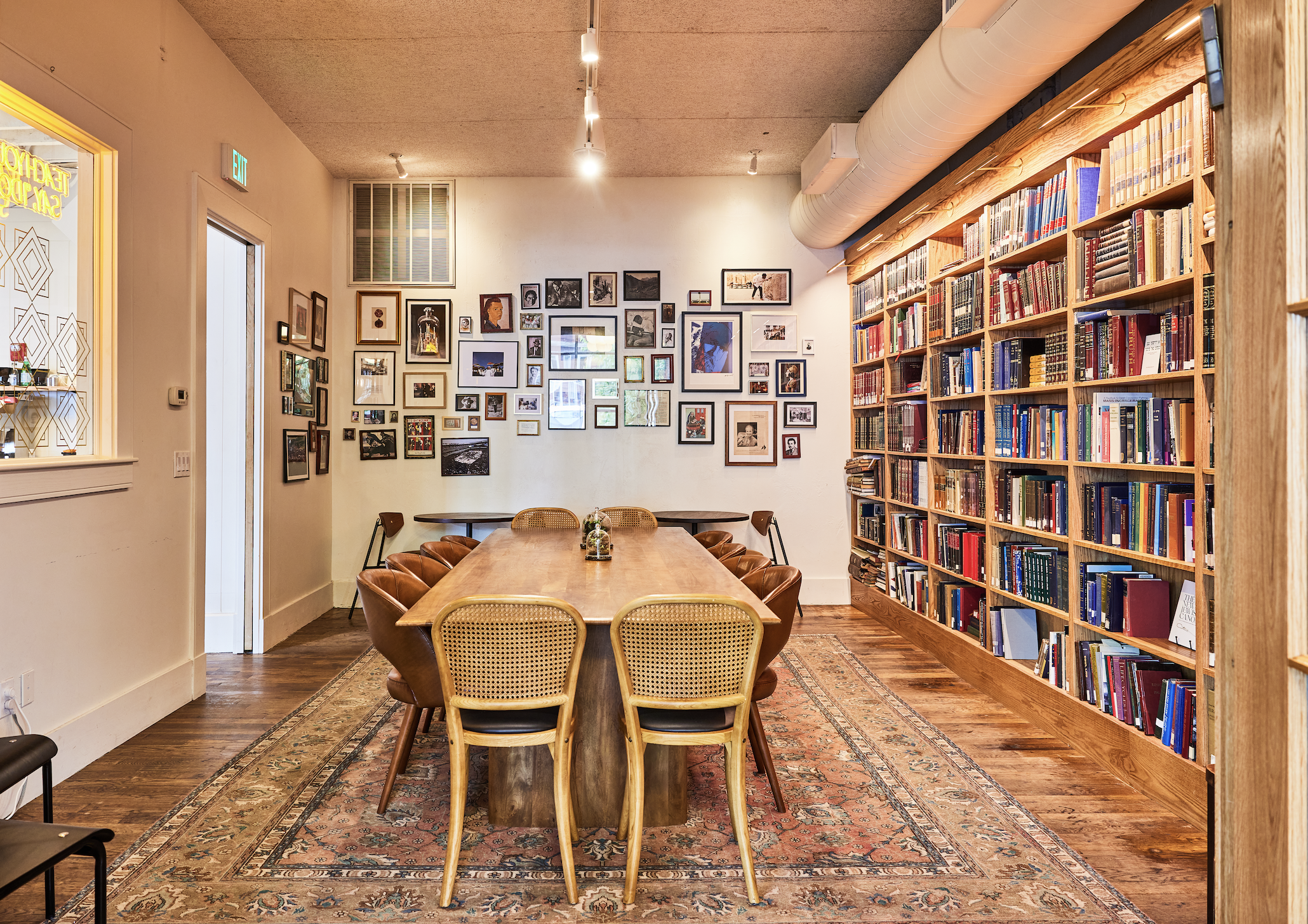
Upcoming Classes &
Events at Lehrhaus
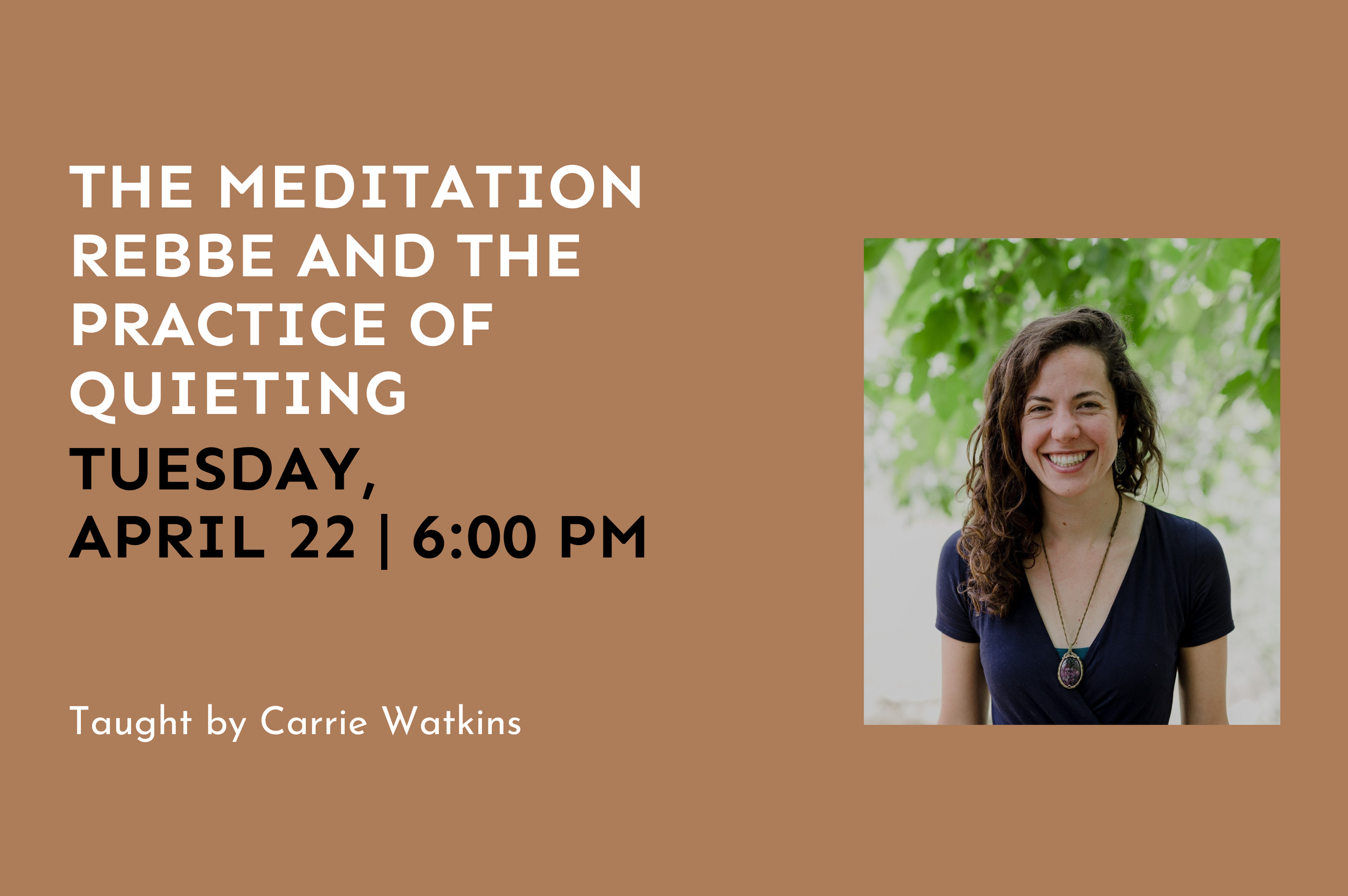
The Meditation Rebbe And The Practice Of Quieting
During this class we will study a letter written by a student of Rabbi Kalonymus Kalman Shapira, a Chassidic Rebbe of Piaseczno, Poland, who became a spiritual leader in the Warsaw Ghetto and left behind profound teachings on resilience and inner work amidst crisis. After exploring its meaning and significance, we’ll take time to experience the practice ourselves.

A Whirlwind History Of The Italian Jews: Part 1
From the early Roman era through the Middle Ages and the Renaissance, we’ll explore how Jews navigated shifting societies, how they were seen by those around them, and the roles they played in a changing world. Instead of getting lost in the details, we’ll focus on narratives that reveal the bigger picture: moments of struggle, triumph, and transformation.

What Are We Doing When We Say "Amen"?
One of the most familiar features of Jewish practice is the use of the term “Amen” after a prayer. The goal of this class is to make this very familiar practice seem strange.

Queer Torah: Blurring Binaries From A Jewish Perspective
Binary ways of thinking-- the "either/or" model-- exist everywhere, not just in relation to gender. In this interactive workshop, we'll learn from contemporary queer and Jewish texts to help us parse out when rigid boundaries serve us well, and what it might mean, at other times, to think from a "nonbinary" perspective. Bring as much or as little gender as you have.

Jewish Themes in Fantasy and Sci-Fi: Milk and Honey
From ancient dreams of a Promised Land to modern reimaginings, Israel has long inspired Jewish artists and authors. Together, we’ll read classic and contemporary stories that engage with Israel as both an ideal and a complex reality. Through tales that celebrate and challenge Israel’s place in the Jewish imagination, we’ll explore these nuanced and provocative works of speculative fiction.

Rediscovering Wonder In A World That Feels Broken: What We Can Learn From The Ancient "Blessing of the Trees"
Each spring, Jewish tradition invites us to say a rare and beautiful blessing upon seeing blossoming trees for the first time: "and the world lacks for nothing." In an age of climate anxiety, loss, and disconnection, these words can feel almost jarring—out of sync with our lived reality. Together, we’ll explore a surprising midrash about how God lured the first human into the world through beauty and ask: does this blessing ask us to do the same—to see the world not as it is, but as it could be? No prior knowledge of Jewish law, Talmud, or even the blessing itself is needed—just come with curiosity, and a willingness to see the world anew.

Avodat T'shura: A Series on Psychedelic Judaism: Session One: Preparation
In this first session, we will cover the significance of preparation in Judaism in understanding the "set and setting" of journeys with psychedelics. Using models from the holidays, Shabbat, and spiritual practices, we will discover that getting ready for something is just as important, if not more important, than the thing itself.

Pishkado i Limon! Exploring Jerusalem's Ladino-Speaking Jews Through “The Beauty Queen of Jerusalem”
Jerusalem has been home to a thriving community of Sefardim for over 500 years. Exiled from Spain in 1492, Sephardic Jews made their home in Jerusalem and dominated the "Old Yishuv". Their familiarity with middle-eastern culture and their poly-lingualism served them well in Jerusalem's Ottoman era. Through Sarit Yishai-Levi's gorgeous work, The Beauty Queen of Jerusalem, we will explore Sephardic life, language, and customs, during the time shortly before and after the founding of the State.

Yiddish on Stage: Bringing "Mayses" to Life
This class will give an inside look at the process of conceiving, adapting, and staging a new piece of theatre based on Yitzkhok Leibush Peretz’s short story Mayses (English: Stories). This class, led by Artistic Director Catherine Nist, will give a behind-the-scenes look at both the practical side of the theatrical process, as well as at the wider philosophical and theological questions underlying the project.

Midrashic Traditions and Ancient Synagogue Art
Ancient synagogues weren’t just places of prayer—they were also filled with stunning mosaics and wall paintings that reimagined biblical stories in surprising ways. These artworks don’t just illustrate the text; they interpret it, often in ways that echo midrashic literature like Genesis Rabbah. In this class, we’ll explore these fascinating depictions, uncover the influences that may have shaped the artists’ choices, and dive into the ongoing debate about the role of rabbis in ancient Jewish society.

“Rules For Ghosting”: Romance Book Club
While back home working in his family's Jewish funeral home, clairvoyant birth doula Ezra falls for widowed death doula Ben… The novel's themes span transitioning, body dysmorphia, being Jewishly observant, navigating complicated family dynamics, consistent and respectful use of pronouns, and navigating conversations about pleasure and consent.

Echoes of the Past, Challenges of the Present: Jews and Race (Part 1)
Race has shaped history, society, and personal identities—including Jewish identities—in profound ways. In this class, we’ll explore why race matters from historical, sociological, Jewish, and personal perspectives.

To "Be" A Jew: Judith Butler and Diaspora Identity
What does it mean to live as a Jew in diaspora—and what might that mean politically, spiritually, and relationally today? We will attempt to establish a definition of diaspora before exploring Judith Butler’s powerful writing on diaspora as our foundation and launching point. Together, we’ll ask: How do we relate to non-Jews around us? What does it mean to be part of a people, scattered but connected? Expect rich discussion, critical frameworks, and new ways to think about your own place in the Jewish story

Spice, Spirit & Story: Exploring Ethiopian Jewish Cuisine with Chef Barhany
Join Chef Beejhy Barhany for an intimate conversation exploring "Gursha", her groundbreaking new cookbook celebrating Ethiopian Jewish cuisine.

Hannah Arendt: The Jew as Pariah (Part 1)
Hannah Arendt was one of the most influential and controversial political thinkers of the 20th century. In this session we will read “The Jew As Pariah: A Hidden Tradition,” which explores how the outsider status of Jews in the diaspora was, for some, an opportunity for independence, creativity, and freedom.

Solarpunk Golems: Technology, Consciousness, and Healing of our Earth
Join us as we explore Becky Chambers’ utopian novel Psalm for the Wild-Built, using its portrayal of earth-based golems and Tellurian powers to examine themes of feminism, environmental consciousness, and restitution. How can these narratives inspire us to imagine a better future?

Passover, Delayed: A Torah Story About Second Chances
What happens when life gets in the way of showing up for something important? In the book of Bamidbar (Numbers), a small group of people miss the chance to celebrate Passover—and instead of being dismissed, they’re given something remarkable: a second opportunity, one month later, known as Pesach Sheni. This class explores that moment and what it means.

Between Worlds: Mizrahi Jews as Mediators, Spies, and Cultural Go-Betweens
Mizrahi Jews (from the Middle East and North Africa) have historically bridged the divide between Jews and Arabs, Hebrew and Arabic, while also facing suspicion and accusations of dual loyalties. This class explores how figures like Arabic broadcasters and mista'arvim (undercover agents) both upheld and challenged cultural boundaries, reimagining the role of Mizrahim in shaping coexistence in a divided region.

Dear Yiddish: Poetry, Memory, and the Power of Language
Join poet Richard Fein for a reading from DEAR YIDDISH, his deeply moving exploration of language, memory, and mortality. With fearless honesty and lyrical brilliance, Fein’s poems bridge the worlds of English and Yiddish, personal history and collective legacy. The reading will be followed by a Q&A with Richard.

Bridging the Divide: Navigating Family Conversations on Controversial Politics
Talking with your loved ones about controversial and divisive politics, especially the Israel/Palestine conflict, can feel overwhelming, emotional, or even impossible. This class will offer tools for navigating these conversations with calm, compassion, and clarity. Whether you're hoping to repair a rift or simply open a difficult conversation, this class will help you show up grounded, thoughtful, and prepared.

Wandering And Otherness: James Joyce's Imaginary Jew
Join Rabbi Benjamin Weiner for a deep dive on James Joyce's Ulysses - no prior experience required!
James Joyce's Ulysses, published in 1922 and still considered one of the most important works of modernist literature, transposed Homer's Odyssey to early-20th century Ireland, but featured a Jewish character, Leopold Bloom, as its hero. Why? We will examine chapter twelve of the book, "The Cyclops", an extended barroom meditation on nationalism and the outsider, love, "force, hatred, history, and all that", and explore how Joyce deploys his imaginary Jew in the midst of this fray. Along the way, you will also get a gentle introduction to this intimidating but delightful masterwork!
Note: No prior experience required. Participants are not expected to have read Ulysses.

Echoes of the Past, Challenges of the Present: Jews and Race (Part 2)
Racism has shaped American history and continues to impact our society today. In this class, we’ll examine how racism operates on both personal and structural levels and explore its connection to Jewish identity and experience.

Seeing The Forest And The Trees: Timeless Jewish Teachings For Navigating Life
This event is for anyone interested in analyzing life for the purpose of living it better—whether through self-exploration, therapy, or drawing on Jewish wisdom for personal growth. Led by Matthew Lowe, a licensed psychotherapist with over a decade of experience, we’ll explore insights from his self-help book Seeing the Forest and the Trees. Together, we’ll learn how to appreciate both the big picture and the finer details of our lives, empowering you to truly make yourself at home in your own life.

Hannah Arendt: The Jew as Pariah (Part 2)
Hannah Arendt was one of the most influential and controversial political thinkers of the 20th century. In this session we will see how Arendt, a fiercely independent thinker, became a pariah among her own people with the publication of "Eichmann in Jerusalem: A Report on the Banality of Evil."

Dine Like A Kabbalist: Eating As A Spiritual Practice
Despite the common notion of spirituality being about asceticism and denying the body, Jewish mysticism has reframed eating as a central way to connect with the Divine. Through exploration of excerpts from 18th century Hasidic rebbes, contemporary kabbalists, Yiddish women's cooking prayers, and modern neo-Hasidic writers, we will explore how our tradition has seen food to be a primary avenue to spiritual uplift.

Avodat T'shura: A Series on Psychedelic Judaism Session Two: Immersion
What does it mean for a trip to be Jewish? How can we stay grounded and keep safe in the midst of expanded states? These questions and more will be examined in this second of three sessions, focusing on the most immersive moments of psychedelic states and what Jewish wisdom has to offer us about encountered moments like these.

A Whirlwind History Of The Italian Jews: Part 2
This session dives into the dramatic transformations of Jewish life in Italy from the mid-1600s to World War II. We’ll explore the realities of the ghetto period, the liberation that followed, and the astonishing rise of Jews to positions of influence as Italy evolved from scattered principalities into a unified nation.

Building Blocks for Judeo-Futurism: Orienting Ourselves in Past, Present, and Future
During our first class together, we will––as the title aptly states––orient ourselves within the larger history of Jewish futurisms. Using scholarship, liturgy, and other modes of “futurisms,” we will begin to collaboratively define our own understandings of the relationships between Jewish histories, presents, and futures.

The Cosmic Orchard: Entering into the Story of the Four Who Entered Pardes
The Talmudic story of the Four Who Entered Pardes (aka "the orchard" of expanded consciousness) can be understood as a kind of cautionary tale of the obstacles along our spiritual path. How do we live this story and become like Akiva, engaging with the spiritual path from a place of whole-heartedness? This session will look at the three spiritual blockages and the second will look at the archetype and lineage of Akiva.

To Life? How Medical Technology Disrupted the Jewish Legal Concept of Dying
What does it mean to be a “dying person” or goses in the intensive care unit of 2025? Could our rabbis have conceived of states of life supported by ventilators, kidney hemodialysis, or experimental therapies? In this session, we will explore the intersection of Jewish law (Halakha), ethics, and modern medical practice in end-of-life care.

Hannah Arendt: The Jew as Pariah (Part 3)
Hannah Arendt was one of the most influential and controversial political thinkers of the 20th century. In the final session, we will examine how Arendt was both a passionate Zionist and a harsh critic of Zionism.

Building Blocks for Judeo-Futurism: Surveying the Landscape of Judeo-Futurism
Using various tools of strategic foresight, we will examine art, culture, media, politics, and academia for concrete, compelling evidence and trends that can help us with perceiving, anticipating, and interpreting how American Jewish communities and identities are changing.

Your Boss is God and Your Work is Never Finished: Jewish Career Wisdom
There are many resources available to those who seek higher pay, professional advancement, or career guidance. How can Jewish texts and teachings also enhance work life? This class will present rich and diverse Jewish perspectives on income, work, and careers that provide a spiritual lens through which to view our professional lives.

The Cosmic Orchard: Becoming Akiva, Becoming Shalom
The Talmudic story of the Four Who Entered Pardes (aka "the orchard" of expanded consciousness) can be understood as a kind of cautionary tale of the obstacles along our spiritual path. Four enter -- one dies, one goes crazy, one becomes a heretic, and only one (Rabbi Akiva) emerges "b'Shalom." How do we live this story and become like Akiva, engaging with the spiritual path from a place of whole-heartedness?

Building Blocks for Judeo-Futurism: Practicing Judeo-Futurism
For our final class together, we will bring together our insights from our first two classes to begin to imagine the impact of climate relocation on various aspects of American Jewish life, from Jewish education, art, liturgy, clergy, family and relationships, and more.

Avodat T'shura: A Series on Psychedelic Judaism Session Three: Integration
In this final session in our series we will think together about ways of talking out what remains present after a psychedelic experience and how that can help fully harvest any meaningful insights which can be tangibly brought into day-to-day life and consciousness.

Artificial Intimacy: Sex and Love in the Golem Canon
Join us as we delve into Sarah Mathews’ poem Golem, using it as a gateway to explore bawdy and thought-provoking Medieval, Modern, and Post-Modern golem tales that grapple with themes of consent, agency, and the complexities of mediated sexual experiences.

Wisdom In Exile: A Mystical Look At The Passover Story
In this class, we will explore a profound and mystical interpretation of the Exodus narrative through Hasidic thought, focusing on the concept that God’s wisdom was “in exile” during the Israelites' time in Egypt. No experience with Jewish mysticism required!
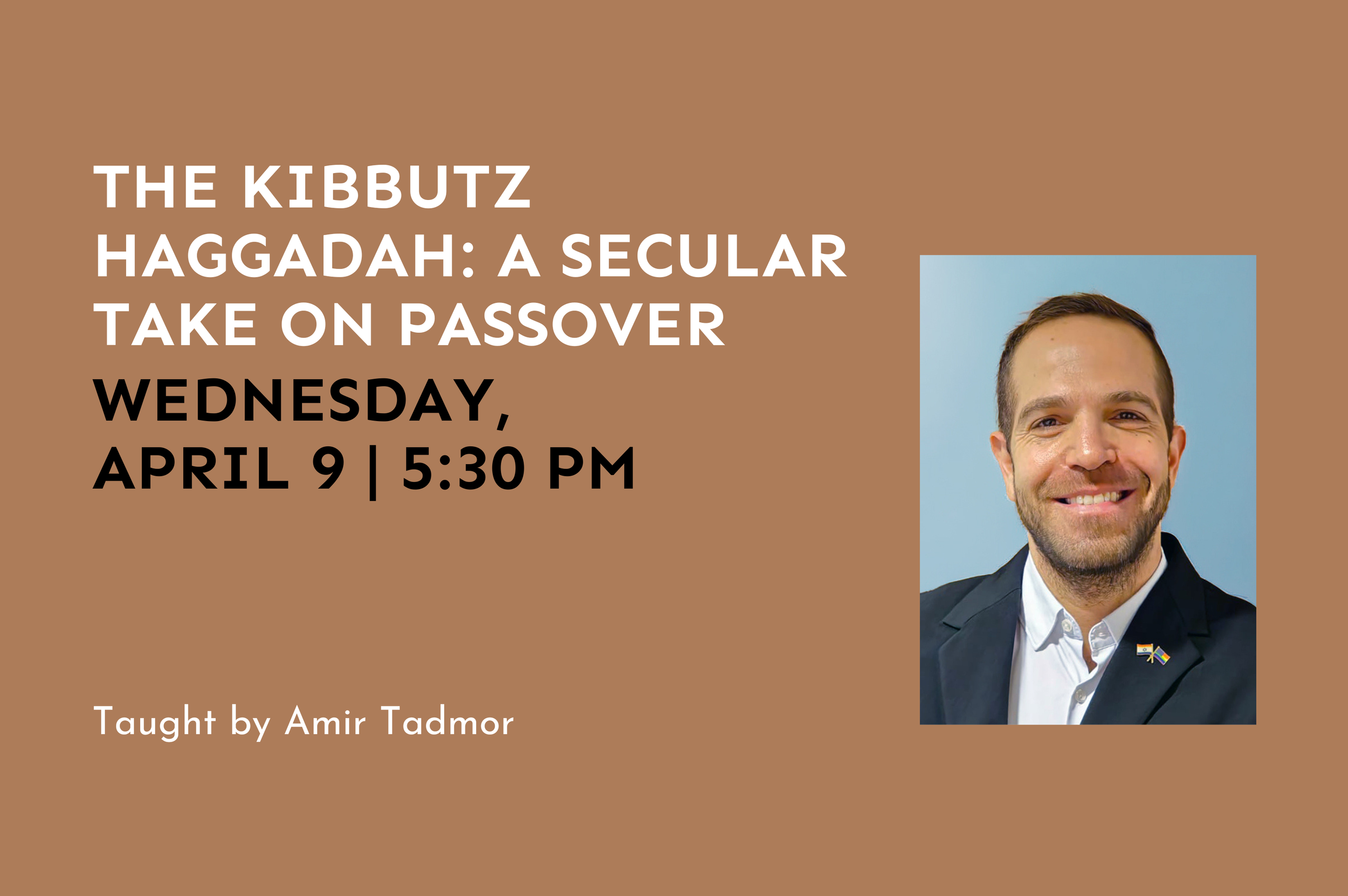
The Kibbutz Haggadah: A Secular Take on Passover
Join Amir Tadmor to explore how the Kibbutz Movement reimagined the traditional Passover Haggadah through their secular, socialist worldview while maintaining meaningful connections to Jewish tradition.

Rebirth of Passover: Eggs, Ashes, and the Eternal Flame
Join us for an artistic exploration of the Passover themes of rebirth and sacrifice. We will dive deep into both themes through engagement with the symbols of seder plate and other symbolic Passover rituals. This session will be inspired by BCI's dynamic teaching approach which combines self-exploration, Jewish texts and traditions, and creative expression.

Rhythms of Jewish Time: Passover in the Cycle of Seasons and History
In this class, we’ll first explore the grand spiral of Jewish time before zooming in on Passover, one of the most powerful moments in our seasonal and historical journey. We’ll uncover the deep connections between spring’s liberation from winter, the Exodus from Egypt, the barley harvest, calving season, new beginnings, and our own personal sense of spiritual renewal.

From Stage to Screen: Jewish Love Stories In American Entertainment
From Abie’s Irish Rose to Hallmark Hanukkah movies, romantic comedies have long explored Jewish identity through love stories that bridge cultural divides. Join us for a conversation on how these narratives reflect, reshape, and sometimes limit the portrayal of Jewish American life in popular culture.

What Story Do We Tell Around The Seder Table? Passover Narratives Between Israel And America
Jews have always re-told the Passover story through the lens of their time—shaped by immigration, the Holocaust, feminism, the Israeli-Palestinian conflict, and more. This year, it takes on new meaning once again. Together, we’ll explore how Exodus speaks to every generation and gather ideas for meaningful family Seders.

A Seat at the Table: A Plant-Based Passover with Chef Micah Siva
Looking for some new and exciting dishes to serve this Passover… and trying to cook for guests from vegan to gluten-free? Join chef, dietitian, and cookbook author, Micah Siva for a demo to make Vegan and Gluten-free Black and White Cookies!

Reclining Women: A Bold Statement Or Gesture Politics?
At the Seder we celebrate our freedom by reclining as aristocrats. The Talmud questions whether this mitzvah applies equally to women. Later rabbis suggested that women are free to recline.
Is this gesture politics for one night a year or does it reflect accurately on a Jewish woman's role all year round? By closely reading Rabbinic sources, participants will gain a deeper understanding of the role that these texts play in modern Jewish life.

The Expiration Date: A Performative Look at Life’s Transitions
"The Expiration Date" is Judah Leblang's poignant and humorous look at some of life's transitions: getting older; dealing with faith and the lack of it; trying to outrun Father Time; and wondering what, if anything, comes next. Prepare to be entertained and stimulated as you watch one gay, Jewish man wrestle with life's big questions.
![Honik af der tsung [Honey on the tongue]: Beginners’ Yiddish Language Class](https://images.squarespace-cdn.com/content/v1/604a17fbc98ac75732163979/1736877285345-HVLJWLNBB6M5DJUP53DG/Squarespace+Image+%281%29.png)
Honik af der tsung [Honey on the tongue]: Beginners’ Yiddish Language Class
When children of the shtetl began their study of Jewish text, the teacher would put honey on the page to show them the sweetness of Jewish learning. Likewise, this class series will explore the fun and vibrancy of Yiddish language and culture. It will introduce students to the fundamentals of Yiddish conversation, reading, and grammar through highly-interactive games, songs, activities, and short texts.

Savoring Identity: How Jewish Food Reflects Culture and Tradition
Why are some foods considered "Jewish" while others aren't? In this class, we’ll explore how Jewish cuisine—from cholent to Chinese takeout—reflects the balance between cultural integration and preserving a unique identity.

The Better Place: A Show From Izzy Abrahmson's Village Life
When Rabbi Kibbitz gives advice, no one listens. He hates being called, with a smirk and a snicker, "a wise man." Just once, hed like to be taken seriously, but all they do is laugh… Will it ever change?
You'll laugh and smile, perhaps sing along, and maybe (just maybe) learn a bit.
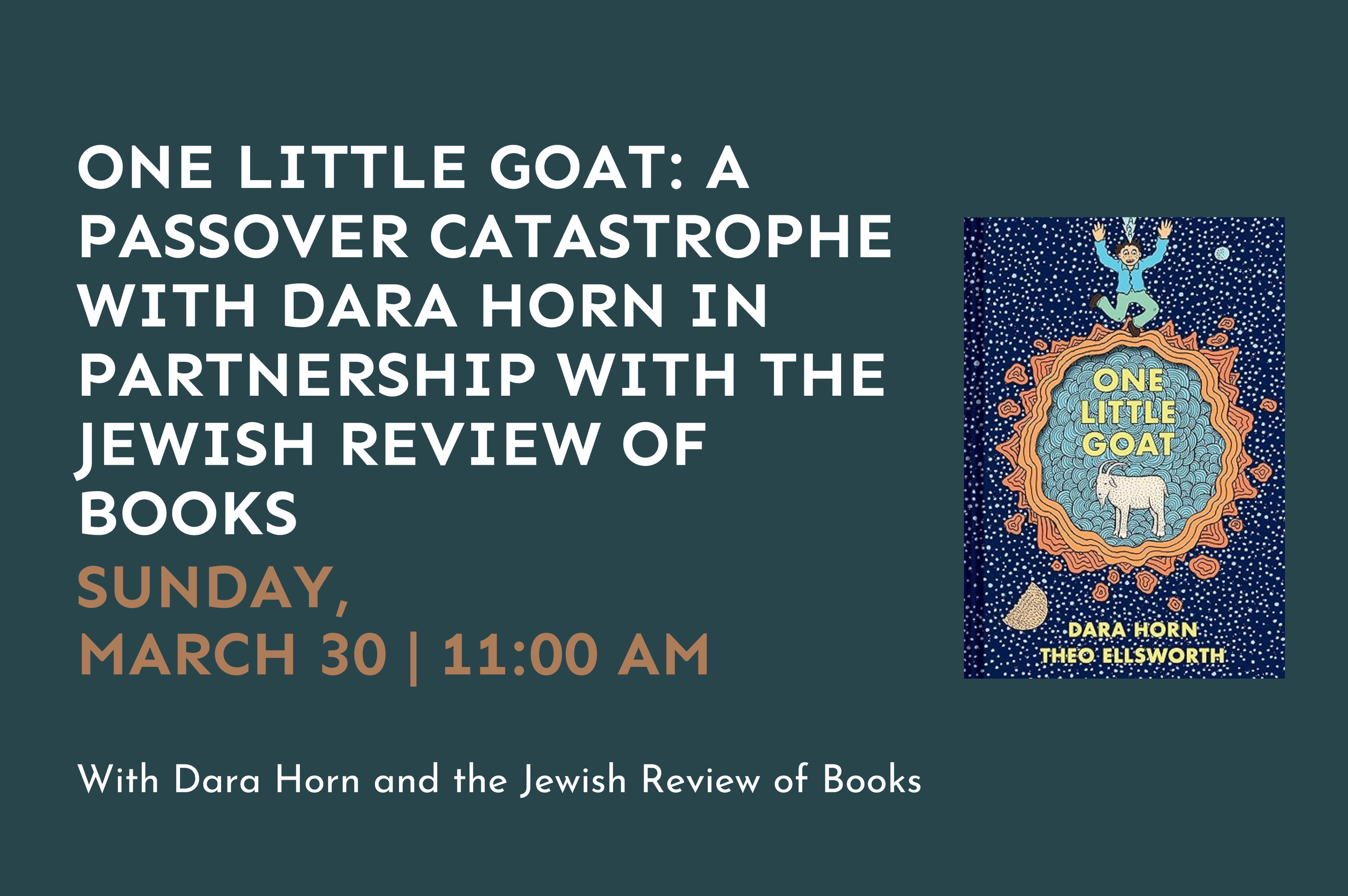
One Little Goat: A Passover Catastrophe with Dara Horn In Partnership with the Jewish Review of Books
Join us for a special event with award-winning author Dara Horn as she shares her new book, One Little Goat: A Passover Catastrophe. This brilliantly illustrated and hilariously chaotic take on the classic Passover song Chad Gadya brings the beloved tale to life in a way you’ve never seen before.

Queer Torah: Trans-ing Jewish Practice
We’re already “queering” things– let’s make “trans” a verb too. In this interactive workshop, we’ll ask, what might it mean to map a transgender perspective onto Jewish practices? People of all identities and experiences are encouraged to attend. Bring as much or as little gender as you have.

**POSTPONED** Kaddish in Contemporary Queer Poetry
How has the Kaddish inspired fascinating, strange experiments in modern U.S. poetry? Our conversation will focus on two examples. Emotionally vehement, sexually explicit, and aesthetically daring, these two long poems help us reflect on the fraught relations between poetry and prayer, as well as between queerness and Jewish tradition. And we’ll explore the cultural importance of elegy — poetry of mourning and memory — as a way to make grief less lonely.
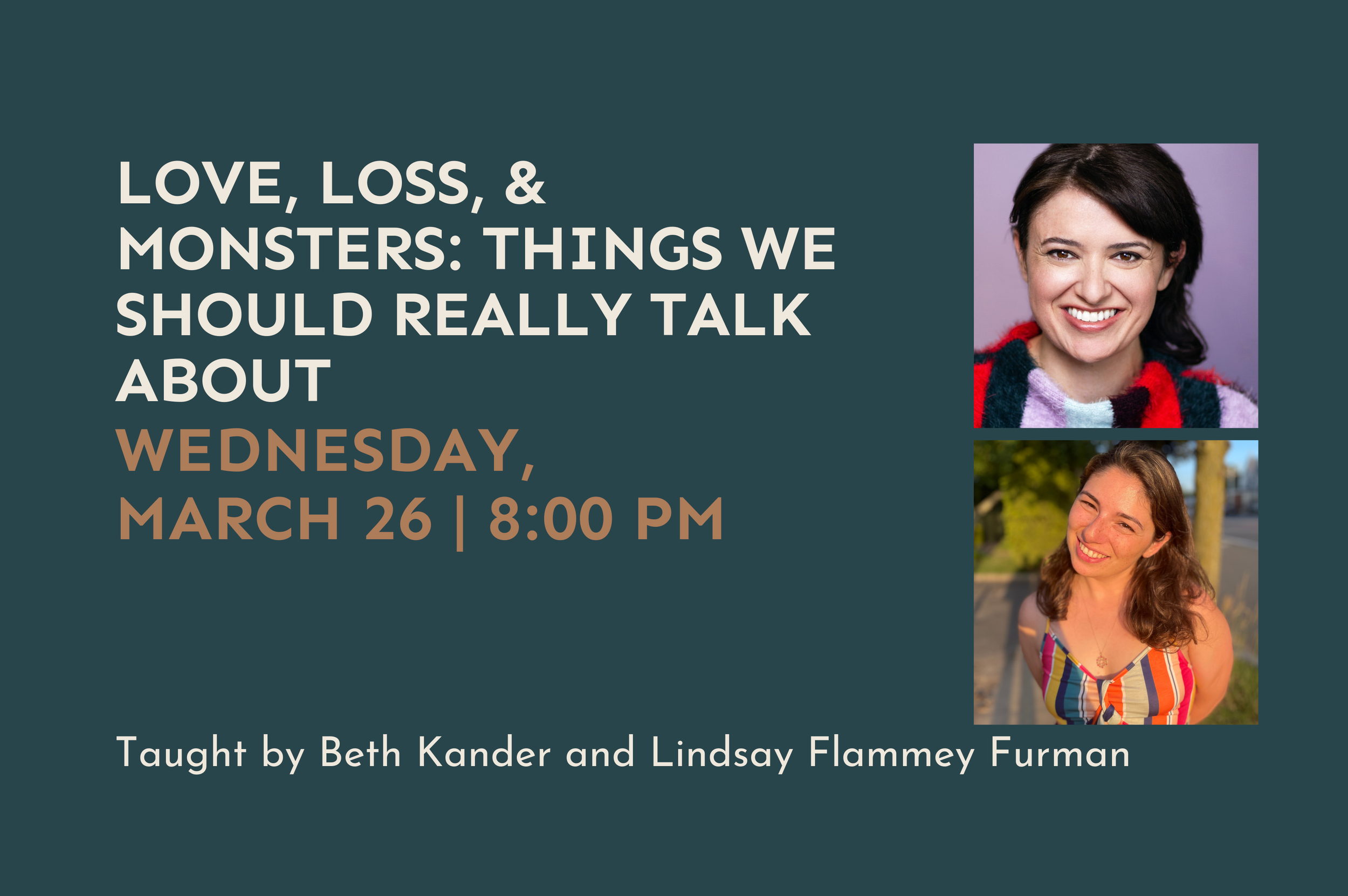
Love, Loss, & Monsters: Things We Should Really Talk About
When a writer brings a golem to life on the page, she never expects it to follow her into reality—but that’s exactly what happened to Beth Kander. Join her in conversation with Lehrhaus Learning Guide Lindsay Flammey Furman as they explore I Made It Out of Clay, the uncanny intersections of fiction and life, and the unexpected role of Hey Alma in the story.

An Unlikely Revolutionary: Celebrating The Life and Legacy of Sarah Schenirer
A Hasidic divorcee in interwar Poland with little formal education, Sarah Schenirer was an unlikely revolutionary. And yet, she changed the course of Jewish history as the founder Bais Yaakov, the first successful school system to give Jewish girls a religious education after millennia of scholastic disenfranchisement. Whether you are a Bais Yaakov affiliate or new to Sarah Schenirer’s story, join us to hear about Frau Schenirer, learn some of her Torah, and celebrate her remarkable legacy on her 90th yahrtzeit.

Labor Organizers and Ladies’ Garment Workers: Jewish Lessons From the Triangle Shirtwaist Factory Fire of 1911
114 years ago, tragedy struck: the Triangle Shirtwaist Factory Fire of 1911 was one of the most devastating workplace disasters in United States history. Due to unsafe working conditions in a New York garment factory, a raging inferno led to the deaths of 146 people in under an hour. This wide-ranging class will cover Jewish teachings on work and worker’s rights, the history of Jewish participation in labor organizing and feminist activism in 20th century America, and tools for grappling with the moral qualms that emerge when Jews are on opposite sides of a political problem – all through the lens of the Triangle Shirtwaist Factory Fire.

The Omer: The Practical And The Spiritual
The Omer is a time of counting. This class will disentangle the interwoven streams of what exactly our people have been counting throughout the ages. From the agricultural to the mystical, we will explore this trepidatious time in our calendar. Participants will also walk away with concrete spiritual practices to ground and deepen their personal Omer counting this year.
![Honik af der tsung [Honey on the tongue]: Beginners’ Yiddish Language Class](https://images.squarespace-cdn.com/content/v1/604a17fbc98ac75732163979/1736877285345-HVLJWLNBB6M5DJUP53DG/Squarespace+Image+%281%29.png)
Honik af der tsung [Honey on the tongue]: Beginners’ Yiddish Language Class
When children of the shtetl began their study of Jewish text, the teacher would put honey on the page to show them the sweetness of Jewish learning. Likewise, this class series will explore the fun and vibrancy of Yiddish language and culture. It will introduce students to the fundamentals of Yiddish conversation, reading, and grammar through highly-interactive games, songs, activities, and short texts.

Shifting Borders: The Political History of Gaza and Its Impact
This class examines the political history of the Gaza Strip from the aftermath of World War I through the present day. It explores the formation of Gaza as a distinct political entity, focusing on the impacts of Egyptian and Israeli occupations and the resulting social and political changes. Participants will explore how these developments continue to shape the ongoing conflict and the region's future.

Writing Workshop: Inspiring Creativity Through Jewish Literature
Calling all creative writers! In this class, we’ll be using Nicole Krauss’ 2014 novel The History of Love to inspire our own writing practice. This class will be a combination of reading, discussion, writing, and sharing what we write.

Deep Torah: A New Way To Read An Old Text
A new way of learning Torah!! Join us on a introductory journey into Deep Torah as together we study and explore Torah in a radically different quasi-mystical way, a way that often reveals new, compelling and inspiring ideas that you've most likely never considered. This class is for people of all levels and it will be an introductory session of the opening text of B'reishit (Genesis).

It Takes Two to Torah: A Book Talk with Abigail Pogrebin & Rabbi Dov Linzer
Join journalist Abigail Pogrebin and Rabbi Dov Linzer for a lively conversation about It Takes Two to Torah, a book that brings humor, insight, and candor to the study of the Five Books of Moses. Born from their popular Tablet Magazine podcast, this unique dialogue between a Reform journalist and an Orthodox rabbi models how Torah can spark meaningful and relevant conversations across perspectives.

Jewish Themes in Fantasy and Sci-Fi: Fairy Tales with Teeth
Not all myths are sweet, and not all legends are safe... In this session, we'll delve into some Jewish tales from the pre-modern age and contrast them with a very contemporary take on a very old story. Join in the conversation on this magical Jewish journey through space and time!

Engendering Rebekah: A New Look Into Our Second Matriarch
All of our foremothers and female ancestors are wonderful inspirations of strength and character. But how is Rebekah different? How does she challenge the gender norms of the Ancient Near East? Together, we'll take a look at the text to decode her story.

*POSTPONED* Jo Sinclair’s Wasteland: A Neglected Classic of U.S. Jewish Literature
Jo Sinclair’s Wasteland (1945) was a prize-winning first novel by a talented young writer exploring questions of Jewish family and identity, psychiatry, and sexuality in the U.S. during World War 2. It’s remarkable for many reasons, not least because it’s the first major U.S. novel with a well-adjusted, happy lesbian character (who happens to be an autobiographical stand-in for the book’s author). Read the novel, if you can, and we’ll discuss it; or if you don’t have time to read it, you can join the class, read some excerpts, and learn more about Sinclair’s work.

Kicking Tradition: Jewish Argentines and Their Soccer Legacy
Jews have been involved in Argentine soccer since its inception, participating as players, administrators, fans, and spectators. This involvement is particularly notable in relation to the Atlanta soccer club. The soccer club has also created one of the few environments where Jews and non-Jews—affiliated and non-affiliated Jews, as well as Zionists and non-Zionists—can interact. This class will explore how Jewish Argentines have actively shaped local culture to serve their needs and aspirations.

Let Them Eat Cheesecake: Minhag, the First Amendment, and Commandedness
Explore the intersection of law and Jewish tradition in this engaging class, where we’ll examine court cases and rabbinic texts to understand how Jewish customs (minhag) are viewed in the context of the First Amendment. Delve into the complexities of whether a religious practice must be commanded to hold legal or religious weight, and uncover how minhag shapes our understanding of binding tradition.
Frequently Asked Questions
-
Our classes are for everyone—whether you’re brand new to the topic or have been engaging with it for years, we encourage participation from people of all backgrounds, identities, and experience levels. Unless otherwise noted, no prior knowledge or experience is needed.
Not sure if a class is for you? Email us at Learning@Lehr.haus!
-
Our tickets utilize a Pay-What-You-Can model so attendees can pay a range of prices based on what they are able to pay to allow for greater accessibility. Please select the price point that feels right for you.
-
If a class is sold out, please email us at learning@lehr.haus and let us know which class you are looking to attend, and we will add your name to the waitlist.
-
While we do not serve food in the study, you are welcome to order and enjoy drinks during class and join us for a meal before or after class. We highly recommend making a reservation if you know you'll be dining with us. Visit www.lehr.haus/reservation to check availability and book a table.
-
Lehrhaus is committed to making our events accessible to everyone. If you require an accommodation or service to fully participate, please email learning@lehr.haus.
Sign up for our Newsletter
